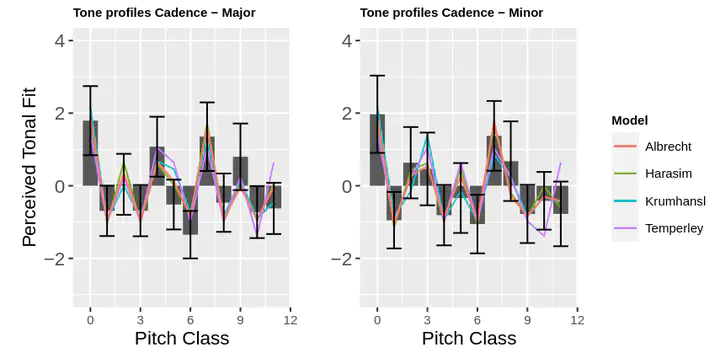
Abstract
When listeners hear stimuli drawn from a Western classical context and are asked to rate the perceived fit of subsequent probe tones, a tonal hierarchy emerges that is consistent with several music-theoretical accounts. The perceptual reality underlying tonal hierarchies has seen much empirical support within and beyond Western classical music. However, a recurrent concern is that such hierarchies may be an artifact of the presence or absence of a probe in a given context. Furthermore, it is currently unclear how the perceived fit varies between different idiomatically valid contexts within the same musical style. Here, 40 participants provided fit ratings in a probe-tone paradigm using scalar and cadential Western classical contexts in both the major and minor mode. The ratings are compared with four models of the tonal hierarchy. The first model derives from average listeners' ratings in a prior perceptual study, and another one is a music-theoretically motivated adjustment of it. Additionally, two models derived from pitch-class distributions in musical corpora are tested. Using Bayesian Mixed Effects models and a model-comparison approach, the four models of tonal hierarchy as well as their combinations are used to predict the new behavioral data. The results are compared with a baseline model that encodes if and how often a given probe tone was contained in the context. Our findings reveal that scalar and cadential contexts can induce differences in perceived tonal fit, with the ratings obtained within cadential contexts showing greater resemblance to models of tonal hierarchies. Additionally, while little evidence is observed in scalar contexts that the models of tonal hierarchy carry incremental predictive power over the baseline model, such evidence is abundant in cadential contexts. The results suggest that probe-tone profiles induced by cadential contexts are shaped by cognitive long-term representations of musical structure, while probe-tone profiles induced by scalar contexts are predominantly guided by lower-level short-term sensory priming.